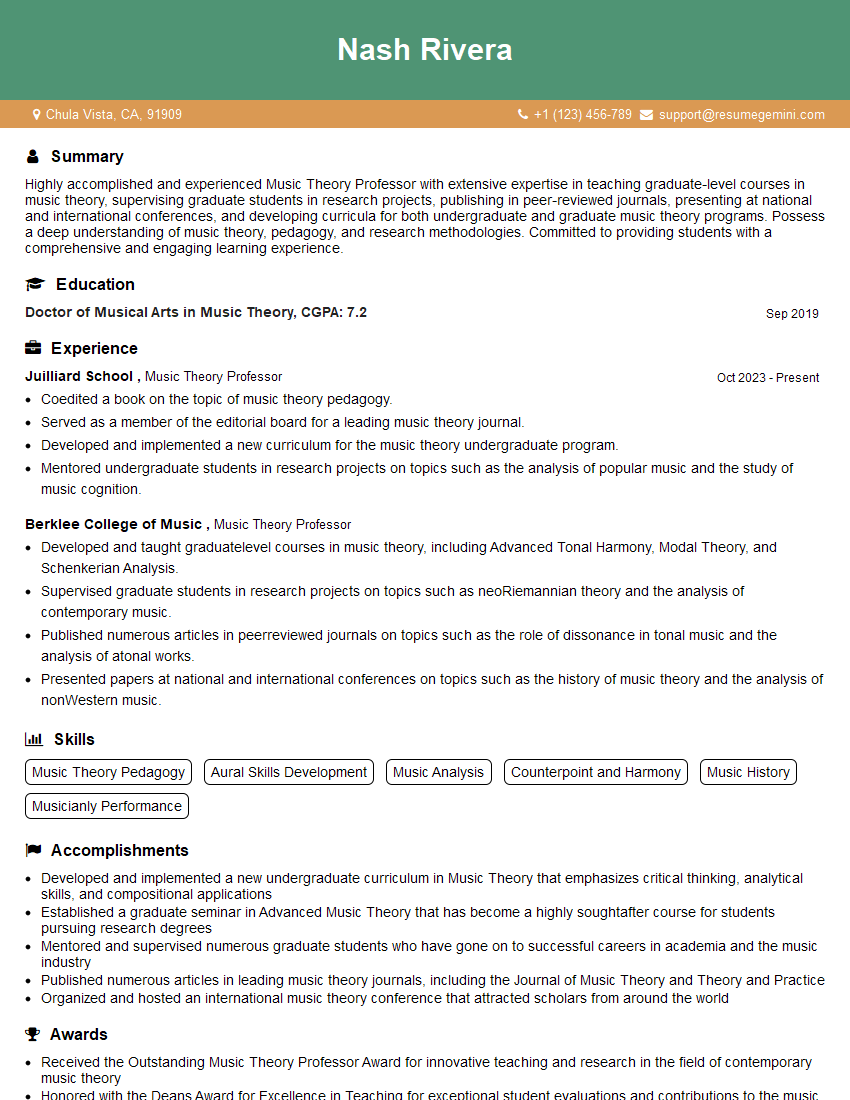Are you a seasoned Music Theory Professor seeking a new career path? Discover our professionally built Music Theory Professor Resume Template. This time-saving tool provides a solid foundation for your job search. Simply click “Edit Resume” to customize it with your unique experiences and achievements. Customize fonts and colors to match your personal style and increase your chances of landing your dream job. Explore more Resume Templates for additional options.

Nash Rivera
Music Theory Professor
Summary
Highly accomplished and experienced Music Theory Professor with extensive expertise in teaching graduate-level courses in music theory, supervising graduate students in research projects, publishing in peer-reviewed journals, presenting at national and international conferences, and developing curricula for both undergraduate and graduate music theory programs. Possess a deep understanding of music theory, pedagogy, and research methodologies. Committed to providing students with a comprehensive and engaging learning experience.
Education
Doctor of Musical Arts in Music Theory
September 2019
Skills
- Music Theory Pedagogy
- Aural Skills Development
- Music Analysis
- Counterpoint and Harmony
- Music History
- Musicianly Performance
Work Experience
Music Theory Professor
- Coedited a book on the topic of music theory pedagogy.
- Served as a member of the editorial board for a leading music theory journal.
- Developed and implemented a new curriculum for the music theory undergraduate program.
- Mentored undergraduate students in research projects on topics such as the analysis of popular music and the study of music cognition.
Music Theory Professor
- Developed and taught graduatelevel courses in music theory, including Advanced Tonal Harmony, Modal Theory, and Schenkerian Analysis.
- Supervised graduate students in research projects on topics such as neoRiemannian theory and the analysis of contemporary music.
- Published numerous articles in peerreviewed journals on topics such as the role of dissonance in tonal music and the analysis of atonal works.
- Presented papers at national and international conferences on topics such as the history of music theory and the analysis of nonWestern music.
Accomplishments
- Developed and implemented a new undergraduate curriculum in Music Theory that emphasizes critical thinking, analytical skills, and compositional applications
- Established a graduate seminar in Advanced Music Theory that has become a highly soughtafter course for students pursuing research degrees
- Mentored and supervised numerous graduate students who have gone on to successful careers in academia and the music industry
- Published numerous articles in leading music theory journals, including the Journal of Music Theory and Theory and Practice
- Organized and hosted an international music theory conference that attracted scholars from around the world
Awards
- Received the Outstanding Music Theory Professor Award for innovative teaching and research in the field of contemporary music theory
- Honored with the Deans Award for Excellence in Teaching for exceptional student evaluations and contributions to the music department
- Granted a prestigious fellowship by the Society for Music Theory to support research on the harmonic analysis of twentiethcentury music
- Recognized as a Distinguished Lecturer by the College Music Society for outstanding contributions to the field
Certificates
- National Association for Music Education (NAfME)
- Music Theory Society of New York State (MTSNYS)
- American Musicological Society (AMS)
- College Music Society (CMS)
Career Expert Tips:
- Select the ideal resume template to showcase your professional experience effectively.
- Master the art of resume writing to highlight your unique qualifications and achievements.
- Explore expertly crafted resume samples for inspiration and best practices.
- Build your best resume for free this new year with ResumeGemini. Enjoy exclusive discounts on ATS optimized resume templates.
How To Write Resume For Music Theory Professor
- Highlight your research experience and publications in your resume.
- Showcase your teaching experience and pedagogical skills.
- Include a statement of your teaching philosophy and how it aligns with the institution’s mission.
- Tailor your resume to each specific job posting, highlighting the skills and experience that are most relevant to the position.
Essential Experience Highlights for a Strong Music Theory Professor Resume
- Develop and teach graduate-level courses in music theory, including Advanced Tonal Harmony, Modal Theory, and Schenkerian Analysis.
- Supervise graduate students in research projects on topics such as neo-Riemannian theory and the analysis of contemporary music.
- Develop and implement a new curriculum for the music theory undergraduate program.
- Mentor undergraduate students in research projects on topics such as the analysis of popular music and the study of music cognition.
- Serve as a member of the editorial board for a leading music theory journal.
Frequently Asked Questions (FAQ’s) For Music Theory Professor
What are the essential qualifications for a Music Theory Professor?
A Music Theory Professor typically requires a Doctor of Musical Arts (DMA) in Music Theory or a related field, along with a strong background in music theory, pedagogy, and research. Experience in teaching music theory at the college level is also highly desirable.
What are the key responsibilities of a Music Theory Professor?
The key responsibilities of a Music Theory Professor include teaching music theory courses at the undergraduate and graduate levels, supervising graduate students in research projects, publishing scholarly articles and books, and presenting at conferences.
What are the career prospects for a Music Theory Professor?
Music Theory Professors can work at colleges and universities, conservatories, and other institutions of higher education. They may also work as music theorists, composers, or music critics.
What are the challenges faced by Music Theory Professors?
Some challenges faced by Music Theory Professors include the need to stay up to date on the latest developments in music theory, the need to balance teaching, research, and service responsibilities, and the need to work with students from diverse backgrounds and with varying levels of musical knowledge.
What are the rewards of being a Music Theory Professor?
The rewards of being a Music Theory Professor include the opportunity to teach and mentor students, the opportunity to conduct research and publish scholarly work, and the opportunity to make a significant contribution to the field of music.